人工智能英文介绍
- 格式:ppt
- 大小:13.57 MB
- 文档页数:14

ARTIFICIAL INTELLIGENCE——人工智能1 Artificial intelligence (AI) is, in theory, the ability of an artificial mechanism to demonstrate some form of intelligent behavior equivalent to the behaviors observed in intelligent living organisms. Artificial intelligence is also the name of the field of science and technology in which artificial mechanisms that exhibit behavior resembling intelligence are developed and studied.2 The term AI itself, and the phenomena actually observed, invite --- indeed demand --- philosophical speculation about what in fact constitutes the mind or intelligence. These kinds of questions can be considered separately, however, from a description of the various endeavors to construct increasingly sophisticated mechanisms that exhibit “intelligence.”3 Research into all aspects of AI is vigorous. Some concern exists among workers in the field, however, that both the progress and expectations of AI have been overstated. AI programs are primitive when compared to the kinds of intuitive reasoning and induction of which the human brain or even the brains of much less advanced organisms are capable. AI has indeed shown great promise in the area of expert systems --- that is, knowledge-based expert programs --- but while these programs are powerful when answering questions within a specific domain, they are nevertheless incapable of any type of adaptable, or truly intelligent, reasoning.4 Examples of AI systems include computer programs that perform such tasks as medical diagnoses and mineral prospecting. Computers have also been programmed to display some degree of legal reasoning, speech understanding, vision interpretation, natural-language processing, problem solving, and learning. Although most of these systems have proved valuable either as research vehicles or in specific, practical applications, most of them are also still very far from being perfected.5 CHARACTERISTICS OF AI: No generally accepted theories have yet emerged within the field of AI, owing in part to the fact that AI is a very young science. It is assumed, however, that on the highest level an AI system must receive input from its environment, determine an action or response, and deliver an output to its environment. A mechanism for interpreting the input is needed. This need has led to research in speech understanding, vision, and natural language. The interpretation must be represented in some form that can be manipulated by the machine.6 In order to achieve this goal, techniques of knowledge representation are invoked. The AI interpretation of this, together with knowledge obtained previously, ismanipulated within the system under study by means of some mechanism or algorithm. The system thus arrives at an internal representation of the response or action. The development of such processes requires techniques of expert reasoning, common-sense reasoning, problem solving, planning, signal interpretation, and learning. Finally, the system must网construct an effective response. This requires techniques of natural-language generation.7 THE FIFTH-GENERATION ATTEMPT: In the 1980s, in an attempt to develop an expert system on a very large scale, the Japanese government began building powerful computers with hardware that made logical inferences in the computer language PROLOG. (Following the idea of representing knowledge declaratively, the logic programming PROLOG had been developed in England and France. PROLOG is actually an inference engine that searches declared facts and rules to confirm or deny a hypothesis. A drawback of PROLOG is that it cannot be altered by the programmer.) The Japanese referred to such machines as “fifth-generation” computers.8 By the early 1990s, however, Japan had forsaken this plan and even announced that they were ready to release its software. Although they did not detail reasons for their abandonment of the fifth-generation program, U.S scientists faulted their efforts at AI as being too much in the direction of computer-type logic and too little in the direction of human thinking processes. The choice of PROLOG was also criticized. Other nations were by then not developing software in that computer language and were showing little further enthusiasm for it. Furthermore, the Japanese were not making much progress in parallel processing, a kind of computer architecture involving many independent processors working together in parallel—a method increasingly important in the field of computer science. The Japanese have now defined a “sixth-generation” goal instead, called the Real World Computing Project, that veers away from the expert-systems approach that works only by built-in logical rules.9 THE FUTURE OF AI RESEARCH: One impediment to building even more useful expert systems has been, from the start, the problem of input---in particular, the feeding of raw data into an AI system. To this end, much effort has been devoted to speech recognition, character recognition, machine vision, and natural-language processing. A second problem is in obtaining knowledge. It has proved arduous toextract knowledge from an expert and then code it for use by the machine, so a great deal of effort is also being devoted to learning and knowledge acquisition.10 One of the most useful ideas that has emerged from AI research, however, is that facts and rules (declarative knowledge) can be represented separately from decision-making algorithms (procedural knowledge). This realization has had a profound effect both on the way that scientists approach problems and on the engineering techniques used to produce AI systems. By adopting a particular procedural element, called an inference engine, development of an AI system is reduced to obtaining and codifying sufficient rules and facts from the problem domain. This codification process is called knowledge engineering. Reducing system development to knowledge engineering has opened the door to non-AI practitioners. In addition, business and industry have been recruiting AI scientists to build expert systems.11 In particular, a large number of these problems in the AI field have been associated with robotics. There are, first of all, the mechanical problems of getting a machine to make very precise or delicate movements. Beyond that are the much more difficult problems of programming sequences of movements that will enable a robot to interact effectively with a natural environment, rather than some carefully designed laboratory setting. Much work in this area involves problem solving and planning.12 A radical approach to such problems has been to abandon the aim of developing “reasoning” AI systems and to produce, instead, robots that function “reflexively”. A leading figure in this field has been Rodney Brooks of the Massachusetts Institute of Technology. These AI researchers felt that preceding efforts in robotics were doomed to failure because the systems produced could not function in the real world. Rather than trying to construct integrated networks that operate under a centralizing control and maintain a logically consistent model of the world, they are pursuing a behavior-based approach named subsumption architecture.13 Subsumption architecture employs a design technique called “layering,”---a form of parallel processing in which each layer is a separate behavior-producing network that functions on its own, with no central control. No true separation exists, in these layers, between data and computation. Both of them are distributed over the same networks. Connections between sensors and actuators in these systems are kept short as well. The resulting robots might be called “mindless,” but in fact they have demonstrated remarkable abilities to learn and to adapt to real-life circumstances.14 The apparent successes of this new approach have not convinced many supporters of integrated-systems development that the alternative is a valid one for drawing nearer to the goal of producing true AI. The arguments that have arisen between practitioners of the two different methodologies are in fact profound ones. They have implications about the nature of intelligence in general, whether natural or artificial。

人工智能的英语解释英文回答:Artificial Intelligence (AI) is the simulation of human intelligence processes by machines, especially computer systems. AI research has been highly successful in developing effective techniques for solving a wide range of problems in many fields, including computer vision, natural language processing, and machine learning.Applications of AI.AI has a wide range of applications in variousindustries and sectors, including:Healthcare: AI-powered systems are used for disease diagnosis, drug discovery, and personalized treatment plans.Finance: AI algorithms are employed for fraud detection, risk assessment, and trading decisions.Transportation: AI is used for autonomous driving, traffic management, and route optimization.Manufacturing: AI techniques are utilized for predictive maintenance, process optimization, and quality control.Retail: AI systems are used for personalized recommendations, demand forecasting, and inventory management.Types of AI.AI can be categorized into different types based on the level of intelligence and autonomy exhibited by the system:Reactive Machines: These AI systems react to the current environment without the ability to learn or remember past experiences.Limited Memory: AI systems with limited memory canstore past experiences and use them to inform current decisions.Theory of Mind: These AI systems can understand the mental states of other entities, such as beliefs, desires, and intentions.Self-Awareness: AI systems with self-awareness are able to reflect on their own thoughts and actions.Benefits of AI.The adoption of AI technology offers numerous potential benefits, such as:Efficiency: AI systems can automate repetitive and time-consuming tasks, freeing up human workers for more complex and creative endeavors.Accuracy: AI algorithms can process large volumes of data and extract patterns and insights that are difficult for humans to identify.Consistency: AI systems can consistently perform tasks without the errors or biases that can affect humandecision-making.Innovation: AI technology drives innovation by enabling the development of new products, services, and processes.Economic Growth: AI has the potential to contribute to economic growth by increasing productivity and creating new job opportunities.Challenges of AI.While AI holds great promise, it also presents several challenges that need to be addressed:Job Displacement: AI systems can displace human workers in certain job roles, raising concerns about unemployment.Bias: AI algorithms can inherit biases from the data they are trained on, leading to unfair or discriminatory outcomes.Security: AI systems can be vulnerable to hacking and misuse, potentially leading to security breaches.Ethics: The rapid advancement of AI raises ethical questions about the responsible development and use of AI technology.Future of AI.The future of AI is highly anticipated, with researchers and industry leaders envisioning a world where AI systems seamlessly collaborate with humans to solve complex problems and enhance human capabilities. As AI technology continues to evolve, it is expected to play an increasingly significant role in shaping the future of society and the economy.中文回答:什么是人工智能?人工智能(AI)是指机器(尤其是计算机系统)模拟人类智能过程的能力。

人工智能的英文短文Artificial Intelligence: Transforming Our WorldArtificial intelligence (AI) is rapidly changing the world we live in. It is a field of computer science that aims to create intelligent machines that can perform tasks that typically require human intelligence.AI has already made a significant impact in various industries. In healthcare, it is being used to diagnose diseases, analyze medical images, and develop personalized treatment plans. In finance, AI algorithms can detect fraud, manage risk, and make investment decisions. In transportation,self-driving cars and drones are being developed with the help of AI.One of the most remarkable aspects of AI is its ability to learn and improve over time. Through machine learning algorithms, AI systems can analyze large amounts of data and identify patterns and trends. This allows them to make more accurate predictions and decisions.However, the development of AI also raises some concerns. As AI becomes more intelligent and autonomous, there are questions about its impact on employment and society. Some people worry that AI will replace human workers and lead to widespread unemployment. Others are concerned about the ethical implications of AI, such as the potential for biased algorithms and the loss of human control.Despite these concerns, the potential benefits of AI are too great to ignore. As we continue to develop and refine AI technologies, we must also address the ethical and social issues that come with it. This will require collaboration between scientists, policymakers, and the public to ensure that AI is developed and used in a way that benefits humanity.In conclusion, artificial intelligence is a powerful technology that has the potential to transform our world. While there are challenges and concerns associated with its development, we must embrace its potential and work together to ensure that it is used for the greater good.。
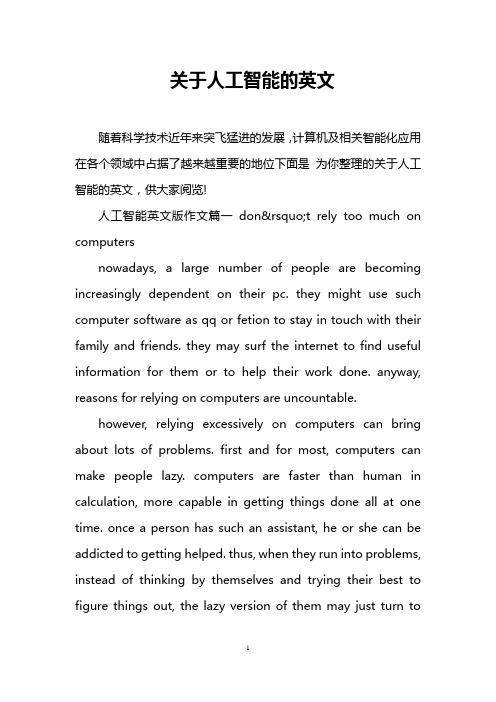
关于人工智能的英文随着科学技术近年来突飞猛进的发展,计算机及相关智能化应用在各个领域中占据了越来越重要的地位下面是为你整理的关于人工智能的英文,供大家阅览!人工智能英文版作文篇一don’t rely too much on computersnowadays, a large number of people are becoming increasingly dependent on their pc. they might use such computer software as qq or fetion to stay in touch with their family and friends. they may surf the internet to find useful information for them or to help their work done. anyway, reasons for relying on computers are uncountable.however, relying excessively on computers can bring about lots of problems. first and for most, computers can make people lazy. computers are faster than human in calculation, more capable in getting things done all at one time. once a person has such an assistant, he or she can be addicted to getting helped. thus, when they run into problems, instead of thinking by themselves and trying their best to figure things out, the lazy version of them may just turn tocomputer for convenience.in my opinion, we should strike a balance between asking for help from computers and working on our own. nevertheless, computers are only tools devised by human who should not be taken place by them. only in keeping our minds active and brains trained can we human invent smarter devices than computer and build a better world of intelligence.人工智能英文版作文篇二how will ai affect our life?with the development of economy and science and technology, ai plays a more and more important role in our life.three months ago,alphago became famous.five one hundred million people watching "man-machine war", in the end it depends on the technical advantage of big data and deep learning in a 4-1 winners’ posture tells people, to ai is no longer just the scene in the movie, but in the real world.ai has become a hot topic for a while,some people welcome the progress and expect ai to benefit mankind in more fields,on the contrary, some others fear that ai will eventually get out of control.in this regard, my view is that ai will bring us morebenefits.for example, it is fashionable for youngsters to purchase daily essentialson some famous websites, liketaobao, ebay and alibaba, through many courier companies.in addition, tesla, google and general motorsdevelopeddriverless cars. what’s more,in the future, the robot will rescue people from dangerous work and so on.i believe that ai will make our life more beautiful.人工智能英文版作文篇三nowadays, artificial intelligence, which is becoming more and more familiar with us with the development of science and technology, is infiltrating into our daily life gradually, and it brings great convenience and progress to our society. although we don't have a great knowledge about the specific content of artificial intelligence, we enjoy the convenience and benefit that artificial intelligence brings to us. we can say that artificial intelligence is changing the way of our living, learning, working and so on.artificial intelligence can be ed as a new science and technology, which is used to simulate human intelligence. namely, computers simulate the way of human's thinking and intelligent behavior, such as learning, reasoning, thinking, planning, and so on. we can't deny the fact that artificial intelligence is of great application nowadays. for example, alot ofintelligent computer or household appliances come into our life, intelligent robots help us to finish some difficult work that we can't do by ourselves, and intelligent control has improved our working greatly. we can say that artificial intelligence exists everywhere.as one of the three most cutting-edge technologies in twenty-first century, artificial intelligence has a very bright prospect. however, the biggest obstacle of it is that it is a subject, which is related to computer science. psychology. philosophy and other knowledge. therefore, what we should do is to study hard, widen our knowledge, and consolidate our professional knowledge. only by this way can we do contribution to the development of artificial intelligence and the improvement of our lives. future trends in computer science is one of the artificial intelligence,it is the research and artificial simulation of human thought and eventually be able to make a human like to think the same machine.for human services and to help people solve problems. after all, people thought it was unique, there are feelings, there are a variety of character, this will be very difficult to achieve in the machine.in fact, to do the same as the human thinking machine, the only one of the artificial intelligence, is by no means all. throughthe study of artificial intelligence, can resolve all kinds of scientific problems, and promote the development of other science, the artificial intelligence is the best!i believe that the science of artificial intelligence is waiting for humanity to explore it step by step the real connotation.。
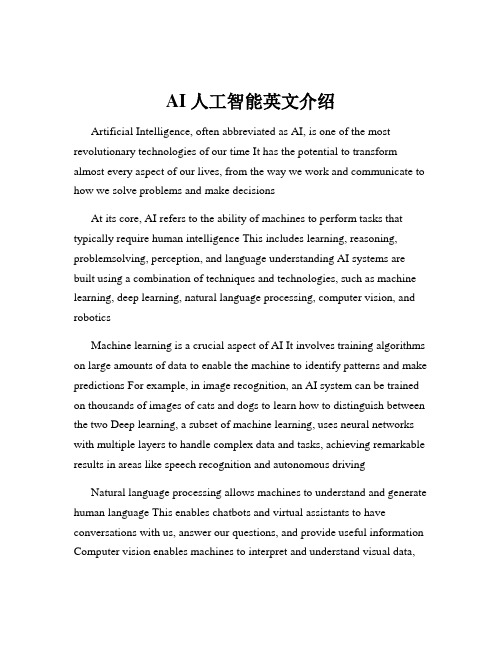
AI 人工智能英文介绍Artificial Intelligence, often abbreviated as AI, is one of the most revolutionary technologies of our time It has the potential to transform almost every aspect of our lives, from the way we work and communicate to how we solve problems and make decisionsAt its core, AI refers to the ability of machines to perform tasks that typically require human intelligence This includes learning, reasoning, problemsolving, perception, and language understanding AI systems are built using a combination of techniques and technologies, such as machine learning, deep learning, natural language processing, computer vision, and roboticsMachine learning is a crucial aspect of AI It involves training algorithms on large amounts of data to enable the machine to identify patterns and make predictions For example, in image recognition, an AI system can be trained on thousands of images of cats and dogs to learn how to distinguish between the two Deep learning, a subset of machine learning, uses neural networks with multiple layers to handle complex data and tasks, achieving remarkable results in areas like speech recognition and autonomous drivingNatural language processing allows machines to understand and generate human language This enables chatbots and virtual assistants to have conversations with us, answer our questions, and provide useful information Computer vision enables machines to interpret and understand visual data,which is essential for applications like facial recognition, object detection, and autonomous vehiclesAI has already made significant impacts in various fields In healthcare, it is used for disease diagnosis, drug discovery, and personalized treatment plans In finance, it helps with fraud detection, risk assessment, and investment decisions In transportation, selfdriving cars and intelligent traffic management systems are being developed Even in entertainment, AI is used to create personalized recommendations and generate realistic virtual charactersHowever, the development of AI also brings some challenges and concerns One of the main concerns is the potential impact on employment As AI automates certain tasks, some jobs may become obsolete, requiring workers to upskill and reskill to adapt to the changing job market Ethical and moral issues also arise, such as bias in algorithms, privacy concerns, and the use of AI in warfareAnother challenge is the interpretability and transparency of AI systems Some AI algorithms are so complex that it is difficult to understand how they arrive at certain decisions, which can lead to trust issues Ensuring that AI is developed and used in an ethical and responsible manner is crucialDespite these challenges, the potential benefits of AI are too great to ignore With continued research and development, AI has the potential to solve some of the world's most pressing problems, such as climate change, disease prevention, and resource managementIn conclusion, AI is a powerful technology that holds both great promise and potential risks As we move forward, it is essential that we approach itsdevelopment and application with caution, ensuring that it benefits humanity as a whole We need to strike a balance between innovation and ethical considerations to shape a future where AI works for the betterment of our society。
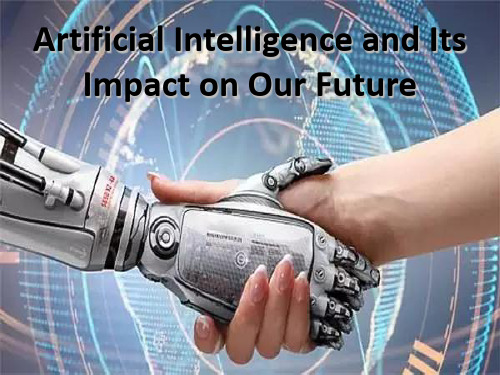

人工智能(AI)的英语作文及译文(精选5篇)篇一:artificial intelligence can make our life more interesting. for example, if we have no company when playing games, artificial intelligence can accompany you.at the same time, artificial intelligence has the ability of self-learning and can be your little assistant in life.artificial intelligence must be the most popular and potential industry in the future. you can earn money to support your family without leaving home.you can completely release yourself, including st udents‘ learning, through artificial intelligence.译文:人工智能可以让我们在生活中更加有趣,比如说我们在玩游戏的时候没有人陪伴,那么人工智能可以陪你,同时人工智能有自我学习能力,可以做你的生活小助手。
篇二:future trends in computer science is one of the artificial intelligence,it is the research and artificial simulation of human thought and eventually be able to make a human like to think the same machine.for human services andto help people solve problems.after all, people thought it was unique, there are feelings, there are a variety of character, this will be very difficult to achieve in the machine.in fact, to do the same as the human thinking machine, the only one of the artificial intelligence, is by no means all. through the study of artificial intelligence, can resolve all kinds of scientific problems, and promote the development of other science, the artificial intelligence is the best!i believe that the science of artificial intelligence is waiting for humanity to explore it step by step the real connotation.译文:计算机科学的未来趋势是人工智能之一,它是对人类思维的研究和人工模拟,最终能够使人类喜欢思考的同一台机器。
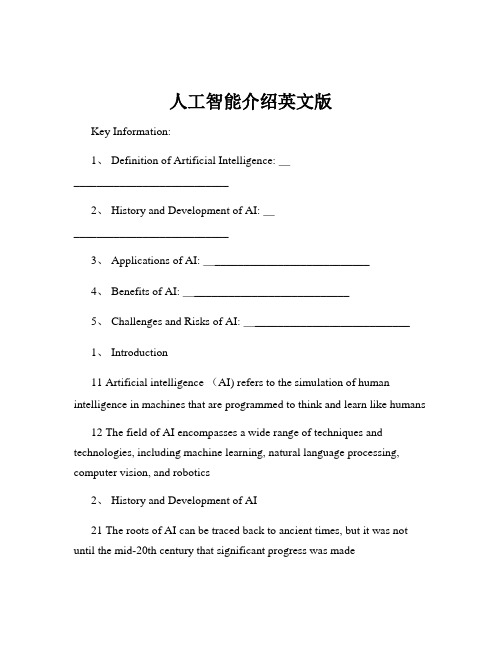
人工智能介绍英文版Key Information:1、 Definition of Artificial Intelligence: ____________________________2、 History and Development of AI: ____________________________3、 Applications of AI: ____________________________4、 Benefits of AI: ____________________________5、 Challenges and Risks of AI: ____________________________1、 Introduction11 Artificial intelligence (AI) refers to the simulation of human intelligence in machines that are programmed to think and learn like humans12 The field of AI encompasses a wide range of techniques and technologies, including machine learning, natural language processing, computer vision, and robotics2、 History and Development of AI21 The roots of AI can be traced back to ancient times, but it was not until the mid-20th century that significant progress was made22 In the 1950s, the concept of AI was formally introduced, and early research focused on developing algorithms for problemsolving and decisionmaking23 Over the years, advancements in computing power, data availability, and algorithmic improvements have led to significant breakthroughs in AI3、 Applications of AI31 Healthcare311 AI is used in medical diagnosis, drug discovery, and patient monitoring312 Machine learning algorithms can analyze large amounts of medical data to identify patterns and predict diseases32 Finance321 In the financial sector, AI is employed for fraud detection, risk assessment, and investment decisionmaking322 Automated trading systems use AI to make rapid and informed trading decisions33 Transportation331 Selfdriving cars and intelligent transportation systems rely on AI for navigation and traffic management332 AI can optimize routes and improve the efficiency of public transportation4、 Benefits of AI41 Increased Efficiency and Productivity411 AIpowered systems can perform tasks faster and more accurately than humans, leading to improved operational efficiency412 Automation of repetitive tasks frees up human resources for more complex and creative work42 Improved DecisionMaking421 By analyzing large amounts of data, AI can provide valuable insights and predictions to support decisionmaking processes422 Businesses and organizations can make more informed and strategic decisions based on AIdriven analytics43 Enhanced Customer Experience431 AIpowered chatbots and virtual assistants offer 24/7 customer service, providing quick and accurate responses432 Personalized recommendations based on AI algorithms enhance the customer experience and increase customer satisfaction5、 Challenges and Risks of AI51 Ethical and Moral Concerns511 Issues such as bias in algorithms, data privacy, and the potential for autonomous weapons raise ethical questions512 Ensuring that AI is developed and used in an ethical and responsible manner is crucial52 Job Displacement521 The automation of certain jobs by AI may lead to unemployment and the need for workforce reskilling and upskilling522 However, new job opportunities are also emerging in the field of AI and related technologies53 Security Risks531 AI systems can be vulnerable to cyberattacks and malicious use532 Safeguarding AI infrastructure and data is essential to prevent security breaches6、 Conclusion61 AI has the potential to bring significant benefits and transform various aspects of our lives62 However, it is essential to address the challenges and risks associated with its development and use to ensure a positive impact on society63 Continued research and ethical considerations will be crucial in shaping the future of AI。

人工智能技术英语作文英文回答:Artificial intelligence (AI) technology is a rapidly developing field with the potential to revolutionize many aspects of our lives. AI encompasses a wide range of technologies, from machine learning and natural language processing to computer vision and robotics. These technologies are being used to automate tasks, improve decision-making, and create new products and services.One of the most significant applications of AI is in the field of automation. AI-powered systems can automate repetitive and time-consuming tasks, freeing up human workers to focus on more complex and creative tasks. For example, AI is being used to automate customer service, data entry, and inventory management. This can lead to significant cost savings and efficiency gains for businesses.AI is also being used to improve decision-making in a variety of industries. AI-powered systems can analyze large amounts of data and identify patterns and trends that would be difficult or impossible for humans to detect. This can help businesses make better decisions about product development, marketing, and investment. For example, AI is being used to predict customer demand, identify fraud, and assess risk.In addition to automation and decision-making, AI is also being used to create new products and services. For example, AI is being used to develop self-driving cars, medical diagnosis tools, and personalized learning systems. These products and services have the potential to improve our lives in many ways, from making it easier to get around to improving our health and well-being.Of course, there are also concerns about the potential negative impacts of AI. Some people worry that AI could lead to job losses, inequality, and even war. It is important to be aware of these concerns and to take steps to mitigate them. However, it is also important to rememberthat AI has the potential to be a powerful force for goodin the world. By using AI responsibly, we can ensure thatits benefits are shared by all.中文回答:人工智能技术。

The Essence of Artificial IntelligenceArtificial Intelligence (AI) is a broad field that encompasses the simulation of intelligent behavior in computers. It's a branch of computer science, striving to create machines capable of intelligent decision-making and problem-solving. AI aims to duplicate the cognitive abilities of humans in areas like learning, reasoning, problem-solving, and understanding natural language.At its core, AI is about the creation of intelligent machines that can sense, think, and act. The term "intelligence" is subjective and complex, but for AI purposes, it typically refers to the ability to perceive and interpret stimuli, reason abstractly or logically, solve problems, learn from experiences, and adapt to new environments.AI systems are designed to mimic human processes like recognition (vision or speech recognition), knowledge representation (data structuring), reasoning (inference and deduction), learning (the ability to adapt or improve performance based on experience), and problem-solving. These systems can range from simple rules-based systems to complex neural networks that can process vast amounts of data and detect patterns to make decisions.AI has numerous applications in various fields, including healthcare, finance, transportation, gaming, and more. It can analyze medical images to detect diseases, manage finances, control autonomous vehicles, create new levels and challenges in games, and much more. AI is also used invoice assistants like Siri or Alexa, which can understand and respond to natural language.AI is continuously evolving as technology progresses. Current research is exploring new techniques like transfer learning and deep learning to create more robust AI systems that can handle increasingly complex tasks. As AI matures, we can expect even more profound impacts on society and the world around us.。
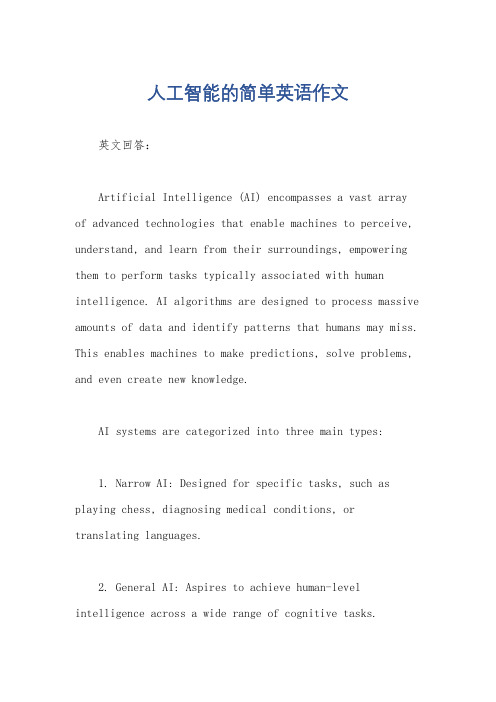
人工智能的简单英语作文英文回答:Artificial Intelligence (AI) encompasses a vast array of advanced technologies that enable machines to perceive, understand, and learn from their surroundings, empowering them to perform tasks typically associated with human intelligence. AI algorithms are designed to process massive amounts of data and identify patterns that humans may miss. This enables machines to make predictions, solve problems, and even create new knowledge.AI systems are categorized into three main types:1. Narrow AI: Designed for specific tasks, such as playing chess, diagnosing medical conditions, ortranslating languages.2. General AI: Aspires to achieve human-level intelligence across a wide range of cognitive tasks.3. Super AI: Hypothetical machines that surpass human intelligence in all aspects.The development of AI has transformed numerous industries, including healthcare, finance, and transportation. In healthcare, AI systems assist in disease diagnosis, drug discovery, and personalized medicine. In finance, AI algorithms enhance risk assessment, fraud detection, and investment strategies. In transportation, AI technologies optimize traffic flow, enhance vehicle safety, and enable autonomous driving.However, AI also raises ethical and societal concerns. As machines become more intelligent and autonomous, questions arise about job displacement, privacy, and the potential for misuse. It is crucial to establish ethical guidelines and regulations to ensure that AI is developed and deployed responsibly.中文回答:什么是人工智能(AI)?人工智能(AI)包含一系列先进技术,使机器能够感知、理解并从周围环境中学习,从而使其能够执行通常与人类智能相关的任务。
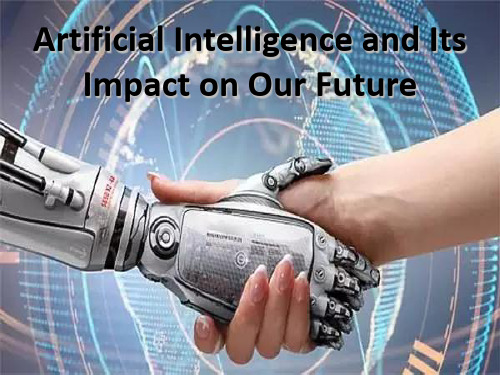


人工智能ai英文介绍Artificial Intelligence (AI): An IntroductionIn the era of rapid technological advancements, artificial intelligence (AI) stands as one of the most exciting and transformative fields. AI refers to the simulation of human intelligence in machines that are programmed to think and learn, enabling them to perform tasks typically requiring human cognition. This article serves as an introduction to AI, discussing its definition, applications, and potential impact on various industries.1. Definition of Artificial IntelligenceAI is a branch of computer science that focuses on creating intelligent machines capable of mimicking human behavior. It involves developing algorithms and models that enable computers to process information, reason, learn, and make decisions. The ultimate goal of AI is to build machines that not only perform tasks but also possess a level of intelligence similar to or surpassing human intelligence.2. History of Artificial IntelligenceThe concept of AI emerged in the 1950s when researchers began exploring the idea of creating machines that can imitate human thinking. The field progressed through various stages, from early rule-based systems to modern machine learning algorithms. Significant milestones in AI history include the development of expert systems, neural networks, and the recent breakthroughs in deep learning.3. Types of Artificial IntelligenceAI can be categorized into two main types: Narrow AI and General AI. Narrow AI, also known as Weak AI, refers to AI systems designed for specific tasks, such as voice assistants or autonomous vehicles. General AI, on the other hand, represents a hypothetical form of AI that possesses the ability to understand, learn, and perform any intellectual task that a human being can do.4. Applications of Artificial IntelligenceAI has found applications across various industries and domains. In healthcare, AI is utilized for medical diagnosis, drug discovery, and personalized treatment plans. In finance, AI is used for algorithmic trading, fraud detection, and risk assessment. Other sectors benefiting from AI include transportation, manufacturing, customer service, and agriculture.5. Impact of Artificial Intelligence on SocietyThe widespread adoption of AI brings both opportunities and challenges. On one hand, AI has the potential to enhance productivity, automate mundane tasks, and improve decision-making. On the other hand, concerns arise regarding job displacement, ethical implications, and biases in AI systems. Striking a balance between technological progress and societal well-being is a crucial consideration for the future of AI.6. Future Trends in Artificial IntelligenceThe future of AI holds immense potential for advancements. Some emerging trends include the integration of AI with other technologies like Internet of Things (IoT) and robotics, the development of explainable AI for transparency, and the focus on ethical AI design. Continued research anddevelopment will drive further innovation and push the boundaries of what AI can achieve.In conclusion, artificial intelligence is a fascinating field that revolutionizes how machines interact and respond to tasks, rivalling human intelligence. This article provided an overview of AI, discussing its definition, history, types, applications, societal impact, and future trends. As AI continues to evolve, it is essential to ensure its ethical and responsible adoption in order to harness its full potential for the benefit of society.。

人工智能优点英文作文英文回答:Artificial intelligence (AI) has emerged as a transformative technology with the potential to revolutionize various aspects of human life. Here are some of the key advantages of AI:1. Efficiency and Productivity: AI algorithms can automate repetitive and time-consuming tasks, freeing up human workers to focus on more complex and creative endeavors. This increased efficiency leads to enhanced productivity and cost savings for businesses.2. Enhanced Decision-Making: AI systems can analyze vast amounts of data and identify patterns and correlations that humans might miss. This enables businesses to make data-driven decisions, reduce risks, and improve outcomes.3. Personalization and Customization: AI algorithms cantailor products, services, and experiences to individual preferences. This personalization enhances customer satisfaction and loyalty while driving sales and revenue.4. Improved Healthcare: AI applications in healthcare can assist in disease diagnosis, drug discovery, and personalized treatment plans. It empowers healthcare professionals with powerful tools to improve patient outcomes and reduce healthcare costs.5. Advancements in Scientific Research: AI algorithms can accelerate scientific research by analyzing large datasets, simulating experiments, and identifying new hypotheses. This contributes to breakthroughs and discoveries in fields such as medicine, physics, and climate science.6. Improved Transportation: AI technologies optimize traffic flow, automate driving, and enhance safety in transportation systems. This reduces congestion, improves efficiency, and promotes sustainability.7. Enhanced Security: AI systems can detect and respond to cyber threats, protect sensitive data, and improve physical security. This strengthens defenses against malicious actors and ensures the privacy and safety of individuals and organizations.8. Language Translation: AI algorithms enable real-time language translation, breaking down language barriers and fostering global communication and collaboration.9. Accessibility: AI-powered assistive technologies empower individuals with disabilities by providing access to information, communication, and mobility. This enhances their quality of life and promotes inclusivity.10. Innovation: AI fuels innovation by providing new tools and capabilities for researchers, engineers, and entrepreneurs. It accelerates the pace of technological advancement and fosters the development of groundbreaking products and services.中文回答:人工智能的优点:1. 效率和生产力,人工智能算法可以自动化重复且耗时的任务,从而解放人力,让他们专注于更复杂和创造性的工作。

关于人工智能英语范文英文回答:Artificial intelligence (AI) refers to the simulation of human intelligence processes by machines, especially computer systems. AI research has been highly successful in developing effective techniques for solving a wide range of problems, from game playing to medical diagnosis. However, AI is still a young field, and there are many challenges that need to be addressed before AI can reach its full potential.One of the biggest challenges in AI is the development of common sense reasoning. Humans are able to use common sense to make inferences and draw conclusions even when they have incomplete or contradictory information. However, AI systems often lack this ability, which can make them brittle and unreliable.Another challenge in AI is the development of efficientlearning algorithms. AI systems need to be able to learn from data in order to improve their performance. However, many learning algorithms are computationally expensive, which can make them impractical for use in real-world applications.Despite these challenges, AI has the potential to revolutionize many aspects of our lives. AI systems are already being used to improve healthcare, transportation, manufacturing, and finance. As AI continues to develop, it is likely to have an even greater impact on our world.Here are some specific examples of how AI is being used today:Healthcare: AI systems are being used to develop new drugs, diagnose diseases, and provide personalized treatment plans. For example, AI-powered systems have been shown to be able to detect cancer cells with the same accuracy as human pathologists.Transportation: AI systems are being used to developself-driving cars, optimize traffic flow, and manage logistics. For example, AI-powered systems are being used to develop self-driving cars that can safely navigate complex traffic conditions.Manufacturing: AI systems are being used to improve production efficiency, quality control, and maintenance. For example, AI-powered systems are being used to develop robots that can work alongside human workers to assemble products.Finance: AI systems are being used to detect fraud, analyze financial data, and make investment decisions. For example, AI-powered systems are being used to develop algorithms that can identify fraudulent transactions with high accuracy.AI is a rapidly developing field with the potential to revolutionize many aspects of our lives. However, there are still many challenges that need to be addressed before AI can reach its full potential.中文回答:人工智能(AI)是指由机器,尤其是计算机系统模拟人类智能过程的能力。

人工智能英语作文60词左右英文回答:Artificial intelligence (AI) refers to the simulationof human intelligence processes by machines, especially computer systems. It involves the development of algorithms and models that enable computers to perform tasks that typically require human intelligence, such as learning, reasoning, and problem-solving. AI encompasses a wide range of techniques, including machine learning, deep learning, natural language processing, and computer vision.The potential benefits of AI are vast and include increased efficiency, productivity, and accessibility. AI-powered systems can automate tasks, improve decision-making, and provide personalized experiences. AI also has the potential to solve complex problems, such as climate change and disease diagnosis. However, the development and deployment of AI also raise ethical concerns, including privacy, bias, and job displacement.中文回答:人工智能(AI)是指机器(尤其是计算机系统)模拟人类智能过程的能力。